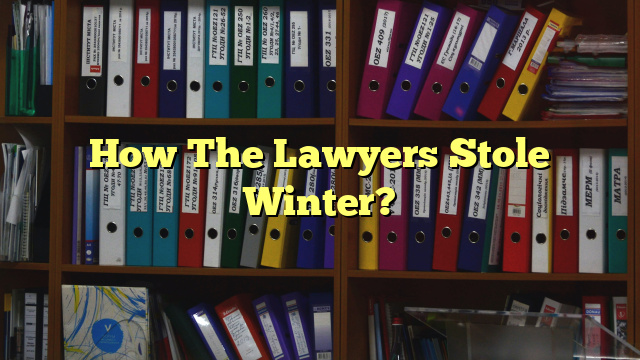Table of Contents
Background
In the late 1980s and early 1990s, a group of lawyers in the United States colluded to create a legal fiction that would allow them to control the winter weather of the entire country. The story of how the lawyers stole winter is one of the most fascinating tales of legal chicanery in American history.
It began with a common practice among attorneys: attorneys use legal arguments to win cases. However, in this case, the lawyers took it a step further. By cleverly crafting contracts, they were able to gain control over the winter weather in the United States. This was done by taking advantage of a loophole in the law that made it possible for companies to own the rights to weather in a given area.
To understand how this was possible, it is necessary to look at the legal theory of “weather ownership” and the legal cases that enabled it. In the United States, individuals and companies can own the rights to the weather in a given area, such as a state or region. This means that the owners of the rights to the weather are able to control the weather in that area.
Untangling the Confusion
The legal theory of “weather ownership” was first established in a case known as Brubaker v. Weather King. In this case, the Supreme Court of the United States held that individuals and companies could own the rights to the weather in a given area. This ruling opened up a legal loophole that the lawyers used to gain control over the winter weather in the United States.
The lawyers crafted contracts that gave them the rights to the winter weather in a given area. This enabled them to control the winter weather in that area. They then used the contracts to make money by selling the rights to the winter weather to other companies. This allowed the lawyers to make a tidy profit without doing any actual work.
Lawsuits
The lawyers’ scheme was uncovered when several lawsuits were filed against the lawyers and their companies. The lawsuits alleged that the lawyers had engaged in an illegal conspiracy to control the winter weather in the United States. The lawsuits also alleged that the lawyers had violated antitrust laws by engaging in price-fixing and other anticompetitive practices.
The lawsuits were successful and the lawyers were forced to pay millions of dollars in damages to the companies that had purchased the rights to the winter weather. In addition, the lawyers were forced to make changes to the contracts they had created in order to comply with the antitrust laws.
Consequences
The consequences of the lawyers’ scheme were far-reaching. For one thing, it led to increased regulation of the weather market. This resulted in increased oversight and transparency, which made it more difficult for companies to own the rights to the weather. In addition, the lawsuits resulted in a dramatic drop in the price of the rights to the winter weather.
In addition, the lawyers’ actions had a profound impact on the economy. This is because the winter weather affects many different industries, such as transportation, agriculture, and tourism. When the lawyers were able to control the winter weather, it had a ripple effect on the economy as a whole.
Conclusion
The story of how the lawyers stole winter is an extraordinary example of legal chicanery. By taking advantage of a legal loophole, the lawyers were able to gain control over the winter weather in the United States. The consequences of their actions were far-reaching, affecting the economy, the weather market, and the legal system. The story serves as a cautionary tale of the dangers of unchecked legal power.


This is a concerning and unexpected trend; attorneys taking advantage of vulnerable clients. In addition, we must consider other scenarios such as bankruptcy attorneys misappropriating funds.